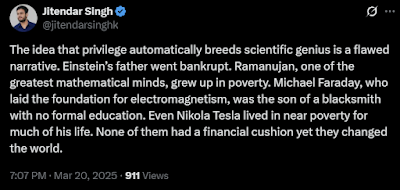(3 mins read)
I must have been about ten years old that summer, when we went to visit my grandparents in Mouhni, a small village in Bihar, about forty kilometers from Bihar Sharif. Every year, as the sun grew hotter and the mango trees grew heavy with fruit, we would pack our bags and head to the village. Summer meant mangoes, long evenings, and the terrace of my grandparents’ house. It was our second home, where grandparents waited for us with open arms and a basket full of stories.
The terrace was our favourite place. After the afternoon heat, we would throw buckets of water on the hot terrace floor to cool it down. Then, we’d lay out a big old carpet mat and sit together, watching the sun dip behind the fields. Sometimes a neighbour would fly their kites and we would keep looking at them soar high in the sky. From somewhere far away, faint strain of music would drift into our ears, sometimes a radio, sometimes a song from a neighbour’s house. We would stay there until the sky turned orange and then deep blue.
After dinner, we would return to the terrace. There were no streetlights, no smartphones, just the sky full of stars. At the time we didn’t know their names, we didnt know if it was a planet, a star, or just a geostationary satellite. Now, I know that the brightest star is Sirius, the brightest planet is Venus. There are other stars, planets, and constellations that exist ,such as Orion, Palledies, Jupiter, which you can see with your naked eye, but we were unaware of them but that didn't limit our imagination; we gave them our own names. We would watch the stars, trace shapes, and follow the slow movement of artificial satellites until they disappeared into the dark. The radio would hum softly, and its songs would become our lullaby.
One day, after lunch and Asr prayer, we were on our way to the terrace as usual. We were about to take the buckets to cool the tiles when suddenly, dark clouds gathered. It wasn’t the usual monsoon rain. Our elders called it 'Kal Baishakhi' a sudden summer storm. The first rain of the season, and we weren’t ready for it. The sky opened up, and the rain poured down. We dropped our buckets, ran inside, laughing and shouting, and spent the evening cuddled on the cot, reading comics and listening to the rain.
The next morning, the sky was clear and blue. We were bored, so my cousins and some friends from the neighbourhood gathered after breakfast. We decided to go to the nearby Eidgah, which stood on top of a small hill which was about five stories high. There's a legend that our village was once ruled by a queen named Mohini (and hence the name of the village - Mouhuni), and her palace was on that hill. No one knew if it was true, but my grandfather said he and his father had seen the Eidgah since his childhood.
The hill wasn't steep, and climbing it was not difficult, but what we found was even better. The storm had knocked down dozens of mangoes. Raw mangoes, big and small, were scattered everywhere. On the path, on the hill, around the Eidgah, mangoes lay like treasure. We didn’t have much space in our pockets, so we started collecting them in the bottom of our shirts, making little pouches. We were thrilled, as if we had won a great prize. We ran back home with big smiles on our faces.
 |
| Image generated using a feature in ChatGPT |
A couple of days later, it rained again, just as heavily. The next morning, we were prepared. We took a few polythene bags with us, determined not to miss out on our mango collection. But to our disappointment, we found only one or two mangoes scattered around. The first rain had taken everything. We came back home with long faces, wondering why the sky didn’t share its treasure twice.
Now, many years later, I tell this story to my kids. They listen very attentively, probably planning that when they get a chance to visit a village, they too will go mango hunting after a sudden summer rain.





























